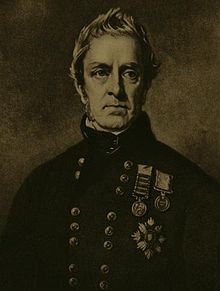
Back چورچ پولوك ARZ George Pollock (General) German جورج پولاک، بارونت اول Persian George Pollock (1er baronnet) French George Pollock, I baronetto Italian George Pollock NB George Pollock Polish Поллок, Джордж Russian George Pollock (militär) Swedish 乔治·波洛克 Chinese
Sir George Pollock | |
|---|---|
 Sir George Pollock | |
| Born | 4 June 1786 Piccadilly, London |
| Died | 6 October 1872 (aged 86) Walmer, Kent |
| Allegiance | |
| Service/ | |
| Years of service | 1801–1846 |
| Rank | Field Marshal |
| Battles/wars | Second Anglo-Maratha War Anglo-Nepalese War First Anglo-Burmese War First Anglo-Afghan War |
| Awards | Knight Grand Cross of the Order of the Bath Knight Grand Commander of the Order of the Star of India |
| Relations | Sir Frederick Pollock, 1st Baronet (brother) |
| Other work | Constable of the Tower |
Field Marshal Sir George Pollock, 1st Baronet GCB GCSI (4 June 1786 – 6 October 1872) was a British Indian Army officer. He first saw action at the Battle of Deeg and at the Siege of Bhurtpore during the Second Anglo-Maratha War before taking part in the Anglo-Nepalese War. He also commanded the British artillery at the Battle of Prome and at Bagan during the First Anglo-Burmese War. Following a disastrous retreat from Kabul in January 1842 during the First Anglo-Afghan War, the retreating forces became stranded at the small British garrison at Jalalabad and Pollock was appointed Commander of the Force sent to relieve the garrison: he advanced through the Khyber Pass and relieved the garrison in April 1842. He then set about an unauthorised but ultimately successful mission to rescue the British hostages who had been left behind in Kabul prior to the retreat. In 1844 the Pollock Medal was created to commemorate Pollock's achievements: this medal was to be awarded to the "best cadet of the season" at the Addiscombe Military Seminary.
© MMXXIII Rich X Search. We shall prevail. All rights reserved. Rich X Search